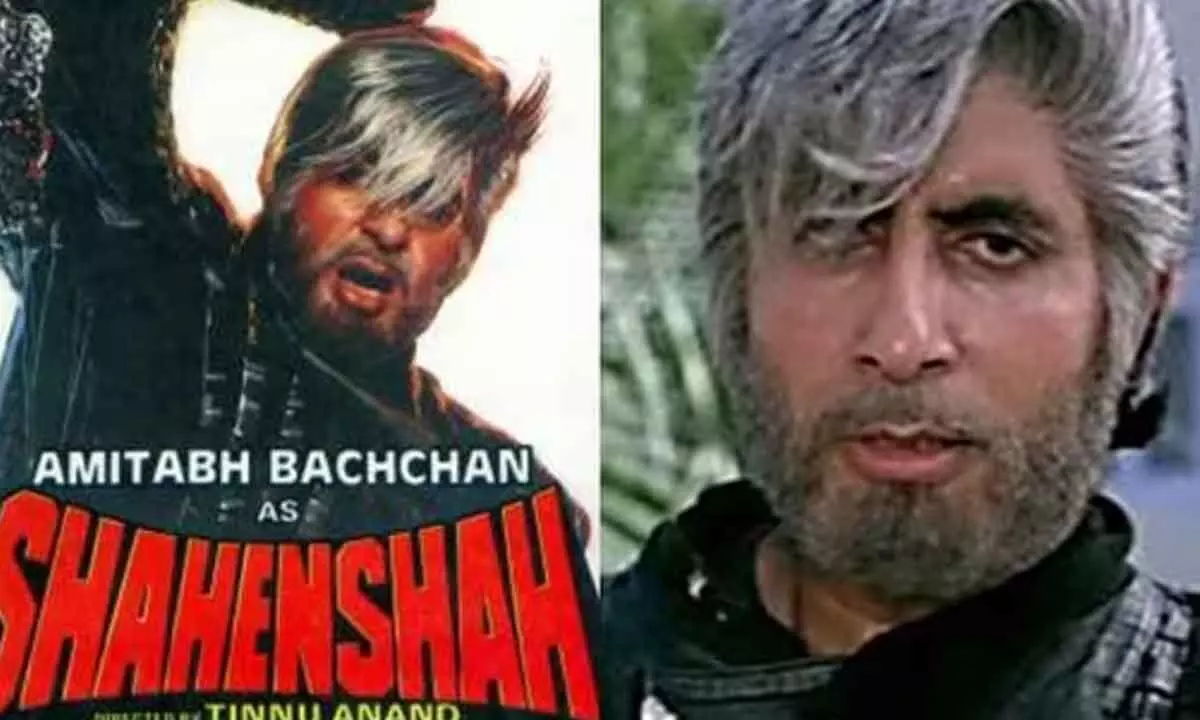Shahenshah: The superhero of the 80’s kid’s imagery

“Shahenshah jahaan khade ho jaate hain, wahin darbaarein lag jaati hain”. Perhaps these words best describe the legend of Amitabh Bachchan – the superstar who never ceased to mesmerize us with his persona, his indomitable spirit and the indelible characters that he portrayed on the screen. In true sense, he is the unrivalled emperor of Hindi cinema – the Shahenshah!
The audio cassettes of Shahenshah were released almost six months prior to its release. Those days, cassettes and radio used to be the most prominent medium for a film's promotion and Shahenshah’ s dialogues, which were strategically included in its playlist, had become a rage before its theatrical release.
Fans were always left awestruck by Amitabh Bachchan's sprawling aura and his comeback to films (after an awry political stint) in the role of an elusive vigilante was incredibly anticipated. Fans of Big B would still remember the iconic dialogues of the film - 'Rishtey Mein Hum Tumhare Baap Lagte Hain' and Kishore Kumar’s last playback for the iconic megastar - 'Andheri Raaton Mein Sunsaan Raahon par' rhapsody.
But this Tinu Anand directorial, conceptualised by none other than Mrs Jaya Bachchan, was also criticized for its facile and far-fetched narrative. Shahenshah albeit it became the second highest grosser of 1988. Tinu had made Kaalia earlier with Big B which also had a queue reference to his stature – Hum Jahaan khade ho jaate hain, line wohi se shuru hoti hai, penned by the late Inderjit Anand.
Bachchan's vigilantism was fuelled by a personal agenda and vendetta he sought for his father's (late Kadar Khan) untimely suicide due to false accusations of corruption. Its manifestation was in the rage and intensity that the eponymous character embodied Aftab Shivdasani played the young Vijay who grows up to become a police officer in the shelter of his benevolent foster uncle Aslam Khan (Pran), while masquerading as a messiah in the Andheri raatein and dispensing justice to the poor. The audience's howls when he pummels Mukhtar Singh(an imposing Praveen Kumar) and his henchmen still echoes in my ears. Infact, the genesis of this character can be traced back to Kaalia, “Mukhtar Singh ka naam suna hai?”!
The other character of a flippant and cowardly, paan-obsessed cop, which he really wasn’t, had amused me. It was also bizarre to accept Mohd. Aziz turning as a playback singer for Big B, when he croons “O Behna O Behna mere Jijaji ka kya kehna” for Supriya Pathak, playing his Raakhi sister.
Meenakshi Sheshadri, who was much younger than Bachchan, paired with him for the first time and they replicated their Jodi in films like Ganga Jamuna Saraswati, Toofan and Akayla. Sheshadri’s bubbly, vivacious and ravishing Shalu would excite and honeytrap the slimy crime baron, JK (an impeccable Amrish Puri) to switch his loyalties from Chivas Regal to Black Dog, even on freaky Fridays! It reminds me that Amitabh and Amrish embraced the same names as Vijay and JK respectively in Salim-Javed written, Shakti!
In these 37 years, Shahenshah has enjoyed a cult status and repeated runs on Sony's movie channels. The power of his character has perpetuated the fantasy and fascination of many filmmakers and actors, eg, Sunil Shetty dreaming of himself as the vigilante hero in Waqt Humara Hai (1993) and Johnny Lever’s Mr. Lova Lova (Ishq, 1997) It vindicates the film's iconic dialogue - "Shahenshah jahan khadey ho jaatey hain, Darbaarein wohin lag jaate hain"
(Inputs from Ahwaan Padhee)


